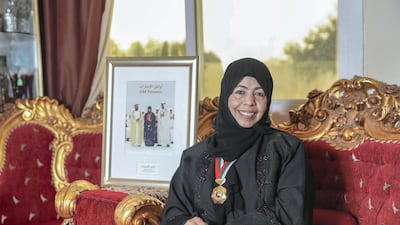Being helicoptered into remote villages was a standard part of the mission entrusted to Fathiya Nadhari by Sheikh Zayed and Sheikha Fatima.
She was sent to speak to Emirati women about their needs.
She would huddle with her countrywomen in makeshift tents in far flung districts and fill out surveys.
As their children played nearby, mothers were taught to read and write, and were given health and safety tips for the home.
“They would say we gave them hope. ‘You are coming from the sky for us,’ they would say when they hugged and kissed us,” said Ms Nadhari, who worked in the office of Sheikh Zayed, the Founding Father .
She was among a group of young women selected by Sheikha Fatima bint Mubarak, Chairwoman of the General Women's Union, President of the Supreme Council for Motherhood and Childhood, Supreme Chairwoman of the Family Development Foundation and wife of Sheikh Zayed, to survey outlying areas and determine the requirements of women in the 1970s and 1980s.
More than 40 years later, Ms Nadhari is a testament to Sheikh Zayed’s vision of education for all and the pioneering ideas of Sheikha Fatima on adult literacy.
Watching UAE leaders interact with people across the country made a lasting impression on her.
“The strategy from the early times was that the lady of the family is important and if she is educated, then the family will be educated,” said Ms Nadhari, seated in her Abu Dhabi living room dominated by gilt-edged cabinets filled with certificates and medals awarded to her and her family for social and educational work.
Seeing Sheikh Zayed visit the centres encouraged men to send their wives to learn.
“They all listened when he asked them to let the ladies study, that they would learn to read the Quran and help their children turn into good people,” she said.
“Sheikha Fatima would go out of the city and meet ladies for four to five hours. She would read our reports herself to understand what they needed.”
The transformation was widespread when hospitals were set up to support small medical clinics and schools with full-time teachers were established alongside learning centres for adults.
"We went to wadis, to villages near Jebel Jais, to the Fujairah hills, to Delma island. The women would tell us, 'At our age we never believed we could learn.' They were so excited and amazed to be able to read," she said.
“Women began reading instructions on medicines. They knew when their children needed medical attention and vaccinations. Many women even finished high school later. We went into people’s homes and convinced women who were pregnant that just because they were pregnant they should not stop studying.”
A champion for women’s rights, Sheikha Fatima launched the General Women's Union in 1975.
Ms Nadhari, now in her 60s, was manager of the capital’s Al Bateen branch for more than 20 years. She also worked with the Emirates Red Crescent society and headed the first aid and community safety department.
Travelling to camps in Jordan, Yemen, Somalia and Sudan, she was part UAE efforts to provide medical assistance to women and orphans.
As a celebration of her lifetime work, she was awarded a UAE Pioneer medal and certificate last year by Sheikh Mohammed bin Rashid, Vice President and Ruler of Dubai and Sheikh Mohammed bin Zayed, Crown Prince of Abu Dhabi and Deputy Supreme Commander of the Armed Forces.
The inspirational messages of their leaders energised young girls to work and serve the country.
“We were super ladies, we would work, study, volunteer,” said Ms Nadhari about starting out as a young volunteer at the age of 17 while she completed high school and then a teaching diploma in Abu Dhabi.
She later studied for a bachelor's degree in psychology and education at Ain Shams University in Cairo.
Family support helped her raise four children, and she acknowledges her husband, a dentist, who encouraged her.
“We are a big family so it was a chance for me to work, because my mother and father were there for my children. My husband has an open mind; he also believed in my work.”
Her daughter Sarah Al Hashemi remembers watching her mother work while the family slept.
“She would give us dinner and then tell us to sleep because she would say, ‘I have a job to do.’ I saw her write reports late into the night.”
Ms Nadhari now volunteers with the Red Crescent, where she is fondly called Mama. She still clocks in to work daily at 7.30am and rarely takes a sick day.
“My mother always talks about the girls’ group that taught them to read. It opened people’s eyes that women could work even when they had children. Mama sparked change so many years ago,” said Amla Bloushi, a Red Crescent volunteer.
For Ms Nadhari, the future of her country is clear. She believes that while the priorities of her generation were education and health awareness, the ambitions of the young should extend further.
“The challenges are different now. Young people must look at the environment, technology and they must help the economy grow. You must have a target for yourself and for your country to help the nation.”


